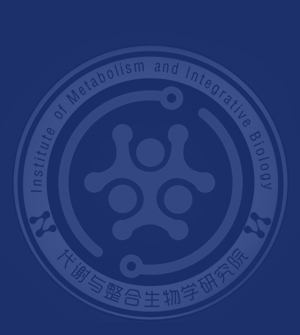

Tel: 0086-21-31242082
Email: wanglingbo@fudan.edu.cn
Office Address: Room D7009, Interdisciplinary Buiding No.2, Fudan University
Personal Profile
2022– PI, PhD Supervisor, Institute of Metabolism and Integrative Biology, Fudan University
2020-2022 PI, PhD Supervisor, Obstetrics and Gynecology Hospital, Fudan University
2017-2020 Postdoctoral Fellow, Fudan University
2010-2017 PhD, CAS Center for Excellence in Molecular Cell Science (Shanghai Institute of Biochemistry and Cell Biology), Chinese Academy of Sciences
Research Interests
We are interested in developing novel mouse modeling techniques to clarify genetic variants and their functions in genetic diseases. By introducing human genetic variants into mouse, we establish gene-edited mouse models that recapitulate patients’ phenotypes to analyze the etiology of diseases such as heritable metabolic diseases and infertility. Also, by optimizing gene editing methods in mouse models, we try to develop safe and efficient strategies to cure hereditary metabolic diseases.
Honors and Awards
2019 NSFC Excellent Young Scholar
2019 Scholar of the Shanghai Rising-Star Program
Selected Publications
*: corresponding;#: co-first
Wang L#, Li M#, Qu C, Miao W, Yin Q, Liao J, Cao H, Huang M, Wang K, Zuo E, Peng G, Zhang S, Chen G, Li Q, Tang K, Yu Q, Li Z, Wong C, Xu G, Jing N, Yu X*, Li J*. CRISPR-Cas9-mediated genome editing in one blastomere of two-cell embryos reveals a novel Tet3 function in regulating neocortical development. Cell Research, 2017, 27:815-829.
Wang L#, Zhang Y#, Fu X#, Dong S#, Tang S, Zhang N, Song C, Yang N, Zhang L, Wang H, Shi H, Jin L, Zhang F*, Li J*, Hua K*. Joint utilization of genetic analysis and semi-cloning technology reveals a digenic etiology of Müllerian anomalies.Cell Research, 2020, 30:91-94.
Wang Y#, Chen J#, Huang X#, Wu B, Dai P, Zhang F, Li J, Wang L*. Gene-knockout by iSTOP enables rapid reproductive disease modeling and phenotyping in germ cells of the founder generation. SCIENCE CHINA Life Sciences, 2023, doi:10.1007/s11427-023-2408-2. (*: corresponding author)
Ruan T#, Ma J#, Shen G#, Wang X#, Yang Y#, Zhuo L#, Jiang C#, Zhao G, Tian Y, Zhao S, Zhou R, Liu M, Tang X, Zhang Y, Zhao C, Zhang J, Li D, Jiang X, Mu D*, Wang L*, Shen Y*. A novel dual histone mark reader ZCWPW2 regulates meiotic recombination through lactylation and transcriptional regulation in humans and mice. Nucleic Acids Research, 2026. (*: corresponding authors)
Cong J#, Yang Y#, Wang X#, Shen Y#, Qi H#, Liu C, Tang S, Wu S, Tian S, Zhou Y, He X, Wang L*, Liu M*, Zhang F*. Deficiency of X-linked TENT5D causes male infertility by disrupting the mRNA stability during spermatogenesis.Cell Discovery, 2022, 8: 23. (*:corresponding authors)
Chen J, Wang Y, Wu B, Shi H*, Wang L*. Experimental and molecular support for Cfap70 as a causative gene of Multiple Morphological Abnormalities of the Flagella with male infertility. Biology of Reproduction, 2023, 109(4):450-460. (*: corresponding author)
Wang Y#, Huang X#, Sun G, Chen J, Wu B, Luo J, Tang S, Dai P, Zhang F, Li J, Wang L*. Coiled-coil domain-containing 38 is required for acrosome biogenesis and fibrous sheath assembly in mice. Journal of Genetics and Genomics, 2023, doi: 10.1016/j.jgg.2023.09.002. (*: corresponding author)
Meng G#, Wang Y#, Luo C#, Tan Y, Li Y, Tan C, Tu C, Zhang Q, Hu L, Zhang H, Meng L, Liu C, Deng L, Lu G, Lin G, Du J, Tan Y, Sha Y*, Wang L*, He W*. Bi-allelic variants in DNAH3 cause male infertility with asthenoteratozoospermia in humans and mice. Human Reproduction Open, 2024, hoae003. (*: corresponding authors)
Zhou Y#, Tu C#, Coutton C#, Tang J#, Tian S#, Tang S, Martinez G, Zhou D, Tebbakh C, Wang J, Zouari R, Zhou X, Mustapha S, Wang X, Wu B, Geng X, Shuang Liu, Jin L, Shi H, Tan Y, Ray P, Wang L*, Yang X*, Zhang F*, Liu C*. Homozygous deleterious variants in MYCBPAP induce asthenoteratozoospermia involving abnormal acrosome biogenesis, manchette structure and sperm tail assembly in humans and mice. SCIENCE CHINA Life Sciences, 2024, doi: 10.1007/s11427-024-2757-7. (*: corresponding authors)
Zhang X#, Wang L#, Ma Y#, Wang Y#, Liu H#, Liu M#, Qin L#, Li J, Jiang C, Zhang X, Shan X, Liu Y, Li J, Li Y, Zheng R, Sun Y, Sun J, Leng X, Liang Y, Zhang F*, Jiang X*, Yang Y*, Shen Y*. CEP128 is involved in spermatogenesis in humans and mice. Nature Communications, 2022, 13: 1395. (#: co-first authors)
Liu M#, Wang L#, Li Y#, Zhi E#, Shen G#, Jiang X#, Li D#, Zhao X, Ruan T, Jiang C, Wang X, Zhang X, Zheng Y, Wu B, Ou N, Zhao G, Dai S, Zhou R, Yang Y*, Liu H*, Yang L*, Shen Y*. (2024). HSF5 deficiency causes male infertility involving spermatogenic arrest at meiotic prophase I in humans and mice. Advanced Science, 2024, doi: 10.1002/advs.202402412. (#: co-first authors)
Tang S#*, Guo T#, Song C#, Wang L#, Zhang J#, Rajkovic A, Lin X, Chen S, Liu Y, Tian W, Wu B, Wang S, Wang W, Lai Y, Wang A, Xu S, Jin L, Ke H, Zhao S, Li Y*, Qin Y*, Zhang F*, Chen Z*.MGA loss-of-function variants cause premature ovarian insufficiency. Journal of Clinical Investigation. 2024, 134(22):e183758. (#: co-first authors)
Liu C#, Tu C#, Wang L#, Wu H#, Houston B, Mastrorosa F, Zhang W, Shen Y, Wang J, Shixiong Tian, Meng L, Cong J, Yang S, Jiang Y, Tang S, Zeng Y, Lv M, Lin G, Li J, Saiyin H, He X, Jin L, Touré A, Ray P, Veltman J, Shi Q, O’Bryan M, Cao Y, Tan Y*, Zhang F*. Deleterious variants in X-linked CFAP47 induce asthenoteratozoospermia and primary male infertility. American Journal of Human Genetics, 2021, 108:309-323. (#: co-first authors)
Liu C#, He X#, Liu W#, Yang S#, Wang L#, Li W, Wu H, Tang S, Ni X, Wang J, Gao Y, Tian S, Zhang L, Cong J, Zhang Z, Tan Q, Zhang J, Li H, Zhong Y, Lv M, Li J, Jin L, Cao Y*, Zhang F*.Bi-allelic mutations in TTC29 cause male subfertility with asthenoteratospermia in humans and mice. American Journal of Human Genetics, 2019, 105:1168-1181. (#: co-first authors)
Zhou Y#, Wang Y#, Chen J, Wu B, Tang S, Zhang F*, Liu C*, Wang L*. Dnali1 is required for sperm motility and male fertility in mice. Basic and Clinical Andrology, 2023, 33:32. (*: corresponding author)
Wang L, Li J. Expansion of the mutant monkey through cloning. SCIENCE CHINA Life Sciences, 2019, 62, 865-867.
Wang L, Li J. ‘Artificial spermatid’-mediated genome editing. Biology of Reproduction, 2019, 101, 538-548.
Li G#, Yang X#, Wang L#, Pan Y, Chen S, Shang L, Zhang Y, Wu Y, Zhou Z, Chen Q, Zhang X, Zhang L, Wang Y, Li J, Jin L, Wu Y*, Zhang X*, Zhang F*. Haploinsufficiency in non-homologous end joining factor 1 induces ovarian dysfunction in humans and mice.Journal of Medical Genetics, 2022, 59:579–588. (#: co-first authors)
Zhou D#, Wu H#, Wang L#, Wang X#, Tang S#, Zhou Y, Wang J, Wu B, Tang J, Zhou X, Tian S, Liu S, Lv M, He X, Jin L, Shi H, Zhang F*, Cao Y*, Liu C*. Deficiency of MFSD6L, an acrosome membrane protein, causes oligoasthenoteratozoospermia in humans and mice. Journal of Genetics and Genomics, 2024, https://doi.org/10.1016/j.jgg.2024.06.008. (#: co-first authors)
Cong J#, Wang X#, Amiri-Yekta A#, Wang L#, Kherraf Z, Liu C, Cazin C, Tang S, Hosseini S, Tian S, Daneshipour A, Wang J, Zhou Y, Zeng Y, Yang S, He X, Li J, Cao Y,Jin L, Ray P*, Zhang F*. Homozygous mutations in CCDC34 cause male infertility with oligoasthenoteratozoospermia in humans and mice.Journal of Medical Genetics, 2022, 59:710–718. (#: co-first authors)
Dai P#, Wang X#, Gou L#, Li Z#, Wen Z#, Chen Z#, Hua M, Zhong A, Wang L, Su H, Wan H, Qian K, Liao L, Li J, Tian B, Li D, Fu X, Shi H*, Zhou Y*, Liu M*. A translation-activating function of MIWI/piRNA during mouse spermiogenesis. Cell, 2019, 179:1566-1581 e1516.
Ke H#, Tang S#, Guo T#, Hou D, Jiao X, Li S, Luo W, Xu B, Zhao S, Li G, Zhang X, Xu S, Wang L, Wu Y, Wang J, Zhang F*, Qin Y*, Jin L*, Chen Z*. 2023. Landscape of pathogenic mutations in premature ovarian insufficiency. Nature Medicine, 2023, 29(2): 483-492.
Jiang J#, Lv W#, Ye X, Wang L, Zhang M, Yang H, Okuka M, Zhou C, Zhang X, Liu L*, Li J*. Zscan4 promotes genomic stability during reprogramming and dramatically improves the quality of iPS cells as demonstrated by tetraploid complementation. Cell Research, 2013, 23, 92-106.
Liu P, Dou X, Liu C, Wang L, Xing C, Peng G, Chen J, Yu F, Qiao Y, Song L, Wu Y, Yue C, Li J, Han J, Tang K, Jing N. Histone deacetylation promotes mouse neural induction by restricting Nodal-dependent mesendoderm fate. Nature Communications, 2015, 6:6830.
Wang X#, Qiao Y#, Xiao M#, Wang L, Chen J, Lv W, Xu L, Li Y, Wang Y, Tan M, Huang C, Li J, Zhao T, Hou Z*, Jing N*, Chin Y*. Opposing roles of acetylation and phosphorylation in LIFR-dependent self-renewal growth signaling in mouse embryonic stem cells.Cell Reports, 2017, 18: 933-946.
Chen Q, Ke H, Luo X, Wang L, Wu Y, Tang S, Li J, Jin L, Zhang F*, Qin Y*, Chen X*. Rare deleterious BUB1B variants induce premature ovarian insufficiency and early menopause.Human Molecular Genetics, 2020, 29, 2698-2707.
Qu C#, Yan M#, Yang S, Wang L, Yin Q, Liu Y, Chen Y, Li J. Haploid embryonic stem cells can be enriched and maintained by simple filtration. Journal of Biological Chemistry, 2018, 293:5230-5235.
Yang J, Guo R, Wang H, Ye X, Zhou Z, Dan J, Wang H, Gong P, Deng W, Yin Y, Mao S, Wang L, Ding J, Li J, Keefe D, Dawlaty M, Wang J, Xu G, Liu L. Tet enzymes regulate telomere maintenance and chromosomal stability of mouse ESCs. Cell Reports, 2016, 15, 1809-1821.



 Fudan Email
Fudan Email Fudan Ehall
Fudan Ehall